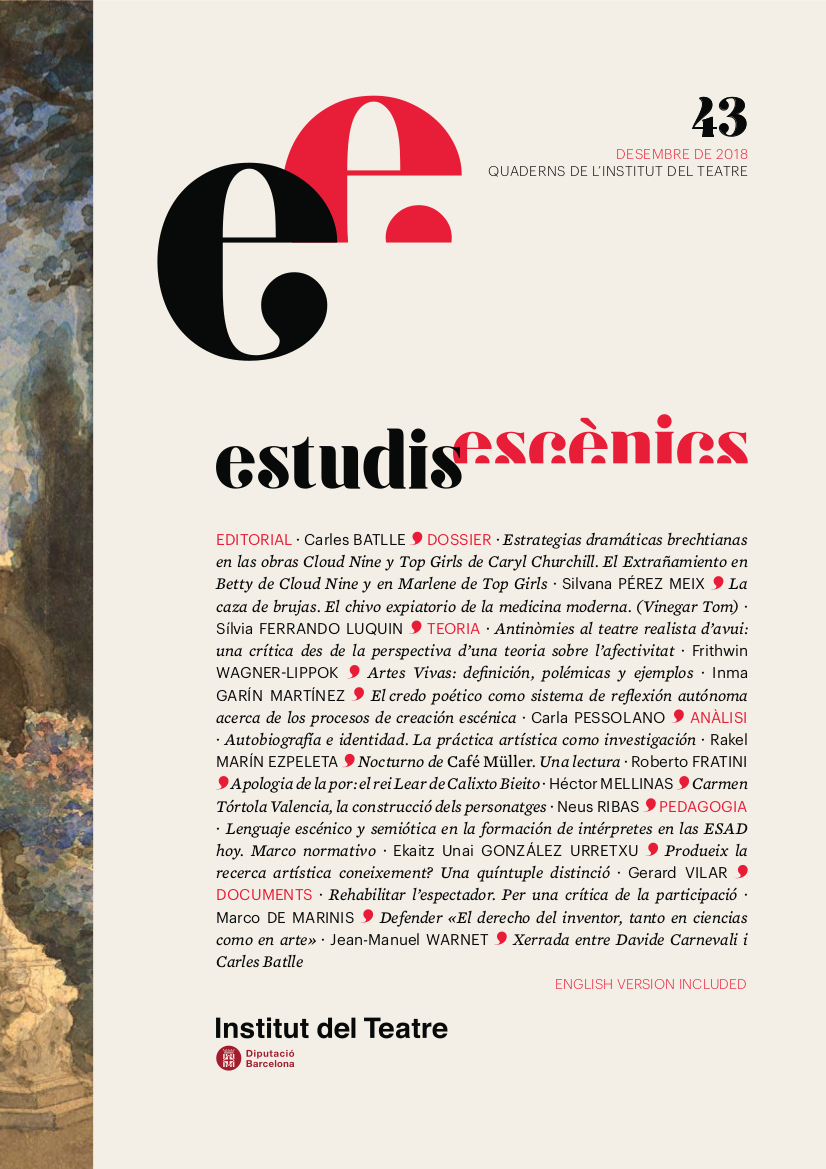Antinomies in Today’s Realistic Theatre: A Critique from an Affective Theory Perspective
Paraules clau:
affective realism, affect theory, affective space, German contemporary theatre, phenomenologyResum
According to the recent book Lob des Realismus (“Praise of Realism”) by Bernd Stegemann, postdramatic theatre has fallen into the trap of poststructuralist
and postmodern positions and lamentably failed to tackle the task of realism. The author holds that in theatre the re-instatement of mimesis is the realistic processing of a material, achieved through the dialec-tic analysis of its contents and historical context. The present article touches the core positions of this criticism, paradigmatically illustrated by René Pollesch’s production Kill your Darlings from 2012, advancing against them an argument from affect theory based upon considerations by another critic of postmodernity, Fredric Jameson: Stegemann’s criticism, intonated on behalf of realism, is sublated on the basis of a different realism model resulting in a diametrically opposed appreciation of Pollesch’s paradigm Kill your Darlings that in the light of Jameson’s theory appears to be a remarkably realistic theatre production. Its success with critics and the audience, as well as the presented affect-theoretical approach, conflict with Stegemann’s position, and it remains uncertain but interesting, even if only for episte-mological reasons, if and how both perspectives can be reconciled.
Referències
Böhme, Gernot. Aistethik. Vorlesungen über Ästhetik als allgemeine Wahrnehmungslehre (Lectures on Aesthetics as General School of Perception). Munich: Wilhelm Fink, 2001.
Butler, Judith. Frames of War. When is Life Grievable? London: Verso, 2009.
Derrida, Jacques. Grammatologie. Frankfurt: Suhrkamp, 1983. Translated from French by Hans-Jörg Rheinberger. Original edition: De la grammatologie. Paris: Éditions de Minuit, 1967.
Dreysse, Miriam; Malzacher, Florian (eds.). Experten des Alltags. Das Theater von Rimini Protokoll (Experts of Every Day Life. The Theatre of Rimini Protokoll). Berlin: Alexander, 2007.
Eiermann, André. Postspektakuläres Theater. Die Alterität der Aufführung und die Entgrenzung der Künste (Post-Spectacular Theatre. The Alterity of Performance and the Blurring of Limits in the Arts). Bielefeld, transcript, 2009.
Gaitsch, Peter et al. (eds.). Eine Diskussion mit Markus Gabriel. Phänomenologische Positionen zum Neuen Realismus (A Discussion with Markus Gabriel. Phenomenological Positions on New Realism). Berlin: Turia + Kant, 2017.
Goffman, Erving. Frame Analysis. An Essay on the Organization of Experience. Boston: Northeastern University Press, 1974.
Hegel, Georg Wilhelm Friedrich. Die Wissenschaft der Logik: Das Sein (Science of Logic: The Being), vol. 1, book 1, section 1, chapter 1, C: “Aufheben des Werdens” (Sublation of Becoming), “Anmerkung” (Notation), 1812. In: Hegel Georg Wilhelm Friedrich, Gesammelte Werke (Collected Works), edited by Hans-Jürgen Gawoll, vol. 11. Hamburg: Felix Meiner, p. 64.
James, William. “The Principles of Psychology”. American Science Series. Advanced Course, vol. II. New York: Holt, 1890.
Jameson, Fredric. The Antinomies of Realism. London: Verso, 2013.
Lehmann, Hans-Thies. Postdramatisches Theater. Frankfurt: Verlag der Autoren, 1999.
Merleau-Ponty, Maurice. Le visible et l’invisible (The Visible and the Invisible). Paris: Gallimard, 1964.
Pollesch, René. Der Schnittchenkauf (Buying Canapés). Berlin, Galerie Daniel Buchholz, 2011.
— “Kill your Darlings! Streets of Berladelphia”. In: Naumann, Matthias; Wehren, Michael (eds.). Räume, Orte, Kollektive (Spaces, Places, Collectives). Berlin: Neofelis, 2013, p. 190-220.
Roselt, Jens. Phänomenologie des Theaters. Munich: Wilhelm Fink, 2008.
Ricoeur, Paul. Die lebendige Metapher (The Living Metaphor). Munich: Wilhelm Fink, 1986. Translated from French by Rainer Rochlitz. Original edition: La métaphore vive. Paris: Edition du Seuil, 1975.
Stegemann, Bernd. Lob des Realismus (Praise of Realism). Berlin: Theater der Zeit, 2015.
— Kritik des Theaters (Critique of Theatre). Berlin: Theater der Zeit, 2013.
Tiedemann, Kathrin and Raddatz, Frank. Reality Strikes Back. Tage vor dem Bildersturm. Eine Debatte zum Einbruch der Wirklichkeit in den Bühnenraum (Days before Iconoclasm. A Debate on the Invasion of Reality into the Stage). Berlin: Theater der Zeit, 2007.
Tygstrup, Frederik. “Affective Spaces”. In: Agostinho, Daniela; Antz, Elisa; Ferreira, Cátia (eds.). Panic and Mourning: The Cultural Work of Trauma. Berlin: Walter de Gruyter, 2012, p. 195- 210.
Woolf, Virginia. The Voyage Out. London, Duckworth, 1915.














